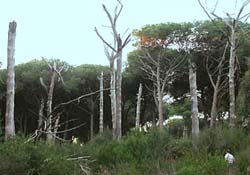The planet Mars possesses two small moons named Phobos (Fear) and Deimos (Terror). Although their existence has been known since their discovery in 1877 and a number of long-range observations have been made by Earth-based telescopes and spacecraft that have visited Mars, the satellites remain only partially studied, particularly Deimos.
Consequently, a number of outstanding scientific questions remain concerning their origins, evolution, physical nature and composition. A recent study fund

During World War II, soldiers from the Fifth U.S. Army set up camp at an exclusive hunting estate in Italy, regrouping between military drives north against German troops and fascist leader Benito Mussolini. Sixty years later, forest pathologists are pointing to huge gaps of dead trees in the estate as the visible reminders of that brief stay.
In a new study published in the April issue of Mycological Research, researchers at the University of California, Berkeley, and in Italy, have unlock
These are exciting times for space exploration. For the first time in a generation, human missions beyond Earth orbit are being seriously considered by space agencies on both sides of the Atlantic. Europe has initiated the Aurora programme, with the ultimate aim of landing people on Mars by 2033, while the U.S. has recently redirected its human space activities towards a return to the Moon.
On Friday 2 April, Dr. Ian Crawford, a planetary scientist based at Birkbeck College, London, will be
Optimizing space missions
Titan, the largest moon of Saturn was discovered by Dutch astronomer Christian Huygens in 1655 and certainly deserves its name. With a diameter of no less than 5,150 km, it is larger than Mercury and twice as large as Pluto. It is unique in having a hazy atmosphere of nitrogen, methane and oily hydrocarbons. Although it was explored in some detail by the NASA Voyager missions, many aspects of the atmosphere and surface still remain unknown. Thus, the existenc
Engineers at Purdue University are developing a system that will enable people to search huge industry databases by sketching a part from memory, penciling in modifications to an existing part or selecting a part that has a similar shape.
“It’s like a special kind of Google that lets you search for parts based on their three-dimensional shapes,” said Karthik Ramani, a professor of mechanical engineering and director of the Purdue Research and Education Center for Information Systems in
A single strand of plant or animal DNA may contain tens of thousands of genes, each programmed to produce a specific protein essential for the growth or survival of the organism. The challenge for geneticists is to isolate individual genes and determine their function – a painstaking process often requiring years of laboratory trial and error.
Now an international research team has discovered a technique that dramatically streamlines this process for certain kinds of genes. Developed by sc